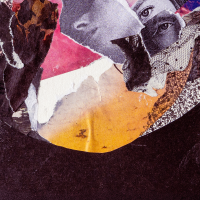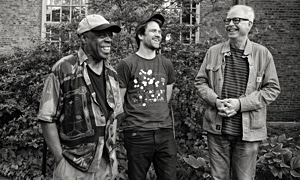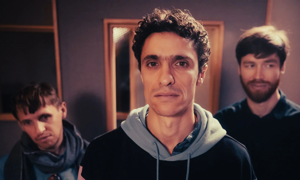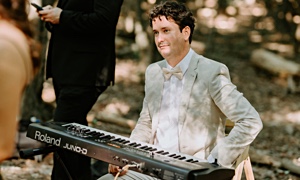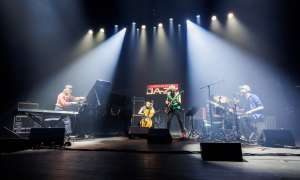Home » Jazz Articles » Six Picks » March 2022
March 2022
 Jun Miyake
Jun MiyakeWhispered Garden
Enja Records / Yellowbird Records
2022
Leaving the hazy Lost Memory Theatre (Enja, 2013, 2015, 2018) behind and moving on to the equally shrouded Whispered Garden, Paris-based trumpeter, composer and sound-architect Jun Miyake introduces us to a musical magnum-creation, his newest, that seems to encompass everything from the composer's darkest desires to his most outrages fantasies, but in the gentlest possible way. Miyake does this with a deep understanding for manifold musical idioms and genres as well as a large network of associates and friends at hand who enhance his unique musical vision. Whispered Garden features contributions from the usual suspects, such as singers Kyoko Katsunuma and Lisa Papineau, bossa nova doyen Vinicius Cantuaria and the "Cosmic voices from Bulgaria"—the folkloric-polyphonic choir that already appeared on Miyake's breakout album Stolen From Strangers (Enja, 2008). Among the other prominent collaborators here are saxophonist Dave Liebman, noise-guitarist and avant-garde pop musician Arto Lindsay as well as late multi instrumentalist Dairo Miyamoto, whose post-humous release Last Picture (Cristal Records, 2018) had been compiled, mixed and created after-the-fact by Miyake himself. Musically, Whispered Garden picks up right where the Lost Memory Act trilogy left off, presenting an eclectic mix of the bossa nova-tinged ("Darois Distantes," "Parece ate Carnaval," "Arraiada"), more traditional jazz cuts ("1979"), chanson ("Le Rêve de l'eau"), numerous cinematic and ethnic instrumentals along with a couple of more-or-less song-based sketches ("Progeny," "The Jamestown Bridge"). Miyake has become completely fluent at juggling the many influences, styles and genres that are dear to his heart and realizes his in turns subtle and extravagant arrangements and reformulations of traditional material with an infinite love for detail in instrumentation and production—delicate sampling and electronics included. With Whispered Garden Jun Miyake may have left the Lost Memory Theatre behind, but his theatrical boldness and dramaturgical-conceptual scope proves more present and accomplished than ever.
 HÜM
HÜM Don't Take It So Personally
Losen Records
2022
This debut by Norwegian piano trio HÜM slowly sneaks up on the listener, gently crawling out from the speakers with the quietly crashing cymbals, dashing piano figurations and crisp double bass lines one today typically associates with terms like "European contemporary" and "chamber-jazz." And no one can deny that pianist Bojan Marjanovic, bassist Bjørnar Kaldefoss Tveite and drummer Magnus Sefaniassen Eide borrow a great deal from the piano trio tradition that the celebrated Munich-based ECM Records is known for having helped shape and develop over the past five decades. But along with the hushed and whispered element, as in the understated interplay the trio presents on opener "Dream Beliefs" and the patiently crescendoing "Kringsjå Blå," also comes a groovy, rhythmically pronounced inclination that favors an R'n'B-esque backbeat over the more abstract slow burn ("After Hours") and a mainstream melodiousness as well as beat-concentric immediacy ("Sedmaya") over more latent melodies and pulses. Amidst the forms and structures brilliant musicianship comes to the fore, marked by Marjanovic's swift flight across the keys as demonstrated on "Kringsjå Blå," the firm groundwork on bass, that doesn't quite break through the supporting role but reveals yet is far more than a passive accompaniment nonetheless. Eide's stick-and brushwork is lively and varied, equally capable in adaptive rubato contexts and stricter environments, bound to odd meters. The group is at its best when it almost entirely lets go of the pre-composed notions, and maybe keeps to the harmonic framework but otherwise feels free to indulge every other spontaneous idea in the moment. It only happens occasionally here, but when it does, HÜM prove to be more than a breath of fresh air.
 OGJB Quartet
OGJB Quartet Ode To O
TUM Records
2022
Each member of the OGJB Quartet is a leader in his own right—saxophonist Oliver Lake and drummer Barry Altschul being pioneers of the creative improvised scene since the '60s and bassist Joe Fonda and cornetist Graham Haynes having followed in their footsteps a decade later. What's more, each of these players has a very distinctive improvisatory and compositional voice, here contributing to the ten-song set in equal parts and with the same inclination towards innovation. A hint of Ornette Coleman—one of the fathers of innovation in jazz and the one whom this sophomore recording by the quartet is in parts dedicated to—pervades most of the cuts and Coleman's celebrated quartet probably was a model for OGJB's approach to interplay. It's obviously revealed in the opener—in music and title— and it's there in "Justice," too, exposed in the oblique, horn-led head and openly declared in its frantic rhythmic backbone, tapping and flapping away, figuratively exclaiming "This is our music"! Order and disarray appear throughout the music in equal measures, spread across the instrumentation in alternating layers. When the horns dialogue in consonance, exposing the compositional elements as a united front (as on "The Me without Mela"), Fonda's bow curves across his double bass with agitation, creating a restless counterforce. In return, as bass and drums swing away in harmony on "Da Bang," doing the likes of Billy Higgins and Ed Blackwell justice, Haynes and Lake are responsible for picking things apart again, bending and sliding notes in a tug of war of seemingly overlapping lines. Extending the debut's instrumentation, Ode to O introduces Haynes' subtle use of electronics in "The Other Side" and the collective improvisation "OGJB #4," expanding the group's sonic repertoire with slight sampling, distortion and delays, overall making this album an exciting and colorful journey through new ideas, inspired by old and tested ones.
 Orquestra Jazz De Matosinhos, Rebecca Martin, Larry Grenadier
Orquestra Jazz De Matosinhos, Rebecca Martin, Larry Grenadier After Midnight
CARA
2022
Considering that throughout her career, Rebecca Martin has teamed up with everyone from Paul Motian, Kurt Rosenwinkel, Jeff Ballard, and Brian Blade to the likes of Guillermo Klein and her partner Larry Grenadier—not forgetting her fairly recent collaboration called "Tillery" with singers Gretchen Parlato and Becca Stevens, one should think that the vocalist/singer-songwriter would be more widely known. And yet, her brilliant and slowly expanding discography remains a treasure-trove mostly reserved for a rather small group of adepts to relish. We can only hope that After Midnight will introduce her compositional ingenuity to a wider audience. It should. The album is a collaboration between the Portuguese brass and wind ensemble Orquestra Jazz De Matosinhos—directed and arranged by Pedro Guedes—and the duo of Grenadier and Martin. It traces highlights from throughout the singer and composer's catalogue, plus a handful of standards. Among her compositions are the title track and "The Space in a Song to think," both originally from The Growing Season (Sunnyside, 2008), now with beautifully layered arrangements that have the horns divided into groups continually echoing the songs' steady arpeggiated guitar chords. "In The Nick of Time (State of the union)," by Grenadier with Martin's lyrics, is a harmonically rich, arpeggio-based tune that blossoms in the broad arrangement for horns that subtly reacts to and expands the already complete sounding trio of Grenadier's bass and Martin's voice and guitar. There's both a vocal-jazz quality and a singer-songwriter element to the singer's voice, as well as her writing, combining a soft and raspy character with subtle, dynamic vocal phrasing while her compositions juggle the intricate harmonic tensions of jazz with often song-oriented structures. These aren't new insights; in fact, they're extensively documented over Martin's past output. What does strike as fresh and yet unheard is how the expansion of the singer's small group writing to large ensembles not just transforms Martin's vision into a new dimension, but her songs now appear even more complete— as if they'd always been intended for these designs. One is reminded of the transfiguration Joni Mitchell accomplished with the help of Vince Mendoza on Both Sides Now (Reprise, 2000), turning her already celebrated composition of the same name into a new evergreen all over again. On After Midnight the standard renditions prove welcome additions to the set and include thoroughly and tastefully wrought scores, but the real treat here is Martin's own writing. One can only hope that more people will start discovering it from here on out, and this is a very good place to start.
 Koichi Sato
Koichi Sato Embryo
Nagalu
2022
Japanese pianist Koichi Sato's Embryo is a two-faced affair, divided into a piano solo set and a program with ensemble, accordingly spread across two CDs. The solo performance comes first and sees the new member of Shinya Fukumori's Nagalu label family sketching subtle miniatures of, in turns, romantic and impressionist design. On the one hand, Sato follows his inner melodiousness, presenting wholesome harmonies as in the cinematic rubato waltz "First Cry" or the melancholic "Orb," which unfolds in arpeggiated chord-patterns, not entirely dissimilar to "Nami." On the other hand, the pianist reveals a fondness for less obviously melodic and more sound-oriented exposés. There's the opener "Hitoshizuku," slowly creating clusters as individual keystrokes grow into a whole. Or "In the Dark"'s focus on sustain and "Sorakagami"'s oblique approach to linear figures —all responsible for bringing repose between structures of more traditional harmonic ambition. The second CD starts by introducing guitar, bass and drums (Fukumori) to the picture, opening up Sato's sound to an entirely different spectrum of possibilities. Much of the pianist's compositional fabric remains the same, but as other instruments—cello, violin, electronics etc.—are consecutively added to the ensemble, Sato's previously simplistic-appearing ideas are revealed to be layered with substance as the instrumentation swells and contracts. The arrangements breathe and interact and the piano disappears into the background, handing the reigns over to an ensemble that works like a chamber organism, rather than a jazz group or a symphonic orchestral unit, with individual instruments growing in and out of the arrangements. Most pieces on the second CD are reprises of the skeletal shapes presented on the first, both in sound and title. But even more, they develop the elements charted the first time around and add counterpoint as they follow down slightly different paths than in the solo renditions. In this way "Aqua" loses speed but turns into a heavy crescendo with cymbals crashing against the arpeggiated progression, thickened by guitar and cello. "Draw" receives a curious treatment, as Sato's piano sound thins and is framed by field recordings of rain, accompanied by dramatically bowed strings. Many of the songs profit from the augmented instrumentation. "Closing Waltz" becomes an elegant trio between guitar, cello and piano with each player adding emotional substance. "First Cry" turns into a chamber delicacy, almost saccharine, but with style, while "Hua" suddenly gets a pop-jazz guise performed by an outstanding quartet made up of guitarist Motohiko Ichino, bassist Masaki Kai , Fukumori and Sato. The latter is certainly a highlight and a direction that deserves to be explored more in the future. It should be noted that Embryo is mixed in mono—a format one is rarely confronted with anymore. The album arrives in beautiful hardcover, two-CD packaging, reflecting the beauty of its contents on the outside.
 Joona Toivanen Trio
Joona Toivanen Trio Both Only
We Jazz Records
2022
After the intro of Finnish pianist Joona Toivanen's new trio record Both Only is finished with elaborating atmospheric soundscapes, "Enlightened" kicks things off with trip-hop flair —a tight shuffling back-beat laid up against catchy minor chords and flexing bass lines. From there the band mesmerizes, softly layering little percussive impulses on top of the firm basic groove as Toivanen introduces the occasional "jazzy" dissonance on piano. The minimalist approach is representative of the album sound and receives extensions as the album progresses. "Acceptance" starts from the quiet, few notes on piano often repeated, sparse percussion growing into another syncopated beat and the tune builds momentum from there, driving straight into yet another beat-concentric mash-up that would stand as an incredible sample on any modern hip-hop album. But unlike "any modern hip-hop album," there are endless nuances in the interplay and sonic details to be discovered as the trio expands and contracts the little elements that act as nucleus for the compositions. From the most ambient extremes ("Direction," "Faculties") to the most deconstructed and nervous passages ("Except For"), the trio proves an engaging unit throughout, capable of both letting go and compulsively organizing every inch of each bar. An album that sucks the listener in deep into its hypnotizing atmosphere and which should be consumed as a whole.
Tracks and Personnel
Whispered GardenTracks: Untrodden Sphere; Hollow Bones; Counterflect; The Jamestown Bridge; Paradica; Farois Distantes; Undreamt Chapter; 1979; Fluctations; Seshat; Parece até Carnaval; Progeny; Le Rêve de L'eau; Witness; Time Song Time; Arraiada.
Personnel: Jun Miyake: flugelhorn, programming, samples, Fender Rhodes; Hitoshi Watanabe: bass; Dave Liebman: saxophone; Masahiro Itami: oud; Lisa Papineau: vocals; Bob Zung: clarinet; Christophe Cravero: piano; Jeff Duquesnois: bassoon; Zé Luis Nascimento: percussion; Dairo Miyamoto: bass clarinet; Dhafer Youssef: voice; Kyoko Katsunuma: voice; Vinicius Cantuária: vocals, guitar, percussion; Bruno Capinan: vocals; Bron Tiemen: vocals; Arthur H: vocals; Arto Lindsay: guitar.
HÜM
Tracks: Dream Beliefs; Kringsjå blå; Don't Take It So Personally; After Hours; Sedmaya; Day Dreamer; Peculiar Being; Arctic Ice; Cvekje Cafnalo.
Personnel: Bojan Marjanović: piano; Bjørnar Kaldefoss Tveite: double bass; Magnus Sefaniassen Eide: drums.
Ode To O
Tracks: Ode To O; Justice; Me Without Bela; Da Bang; The Other Side; Caring; OGJB #3; Bass Bottom; OGJB #4; Apaixonado.
Personnel: Oliver Lake: saxophone; Graham Haynes: cornet, electronics; Joe Fonda: double bass; Barry Altschul: drums, percussion.
After Midnight
Tracks: The Space In A Song To Think; In The Nick Of Time (State of The Union); Brother Can you Spare A Dime; Kentucky Babe; After Midnight; Portrait; Don't Mean A Thing At All; Willow Weep For Me; All Day She Wrote; Lush Life; Joey.
Personnel: Orquestra Jazz De Matosinhos (musical direction & arrangements: Pedro Guedes); Rebecca Martin; Larry Grenadier.
Embryo
Tracks: CD 1: Hitoshizuku (一雫); Genesis; First Cry; Aqua; Orb; Nami (波); In the Dark; Closing Waltz; Draw; May Song; Hua; Ninth Moon; Sorakagami (空鏡); Mother's Pool
CD 2: Arise; Aqua; Ajisai (紫陽花); Draw; Closing Waltz; Genesis; Kuchinashi (梔子); First Cry; Balloon; In The Dark; Hua; May Song
Personnel: Koichi Sato 佐藤浩: piano; 市野元彦: guitar; 甲斐正樹 : bass; 福盛進也: drums; Robin Dupuy: cello; 伊 藤彩: violin; 梶谷裕子: violin; 吉田篤貴: viola; Zeze Wakamatsu: soundscape;
Both only
Tracks: Both Only; Enlightened; Acceptance; Direction; Faculties; Of Profession; In Place; Except For; This and This.
Personnel: Joona Toivanen: piano; Tapani Toivanen: bass; Olavi Louhivuori: drums
Tags
Six Picks
Pat Youngspiel
Enja
Yellowbird
Jun Miyake
Kyoko Katsunuma
Lisa Papineau
Vinicius Cantuária
Dave Liebman
Arto Lindsay
Dairo Miyamoto
Losen Records
Bojan Marjanovic
TUM Records
Oliver Lake
Barry Altschul
Joe Fonda
Graham Haynes
Ornette Coleman
Billy Higgins
Ed Blackwell
Rebecca Martin
Paul Motian
Kurt Rosenwinkel
Jeff Ballard
Brian Blade
Guillermo Klein
Larry Grenadier
Gretchen Parlato
Becca Stevens
Joni Mitchell
Vince Mendoza
Nagalu Records
Shinya Fukumori
We Jazz Records
Joona Toivanen
PREVIOUS / NEXT
Support All About Jazz
 All About Jazz has been a pillar of jazz since 1995, championing it as an art form and, more importantly, supporting the musicians who make it. Our enduring commitment has made "AAJ" one of the most culturally important websites of its kind, read by hundreds of thousands of fans, musicians and industry figures every month.
All About Jazz has been a pillar of jazz since 1995, championing it as an art form and, more importantly, supporting the musicians who make it. Our enduring commitment has made "AAJ" one of the most culturally important websites of its kind, read by hundreds of thousands of fans, musicians and industry figures every month.












